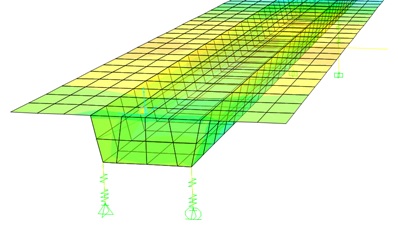ACCESO LIBRE AL ARTÍCULO:
The following personal article link, which will provide free access to your article, and is valid for 50 days, until September 14, 2016
http://authors.elsevier.com/a/1TROAW4G4Bhqk
Abstract: This paper presents a multiobjective optimization of post-tensioned concrete road bridges in terms of cost, CO2 emissions, and overall safety factor. A computer tool links the optimization modulus with a set of modules for the finite-element analysis and limit states verification. This is applied for the case study of a three-span continuous post-tensioned box-girder road bridge, located in a coastal region. A multiobjective harmony search is used to automatically search a set of optimum structural solutions regarding the geometry, concrete strength, reinforcing and post-tensioned steel. Diversification strategies are combined with intensification strategies to improve solution quality. Results indicate that cost and CO2 emissions are close to each other for any safety range. A one-euro reduction, involves a 2.34 kg CO2 emissions reduction. Output identifies the best variables to improve safety and the critical limit states. This tool also provides bridge managers with a set of trade-off optimum solutions, which balance their preferences most closely, and meet the requirements previously defined.
Keywords
- Multiobjective optimization;
- CO2 emissions;
- Safety;
- Post-tensioned concrete;
- Box-girder bridge;
- Multiobjective harmony search
- A multiobjective optimization of post-tensioned concrete road bridges is presented.
- A computer tool combines finite-element analysis and limit states verification.
- Output provides a trade-off between cost, CO2 emissions, and overall safety factor.
- Near the optima, a one-euro reduction represents a 2.34 kg CO2 emissions reduction.
- Results show the cheapest and most eco-friendly variables for improving safety.
Reference:
GARCÍA-SEGURA, T.; YEPES, V. (2016). Multiobjective optimization of post-tensioned concrete box-girder road bridges considering cost, CO2 emissions, and safety. Engineering Structures, 125:325-336. DOI: 10.1016/j.engstruct.2016.07.012.

